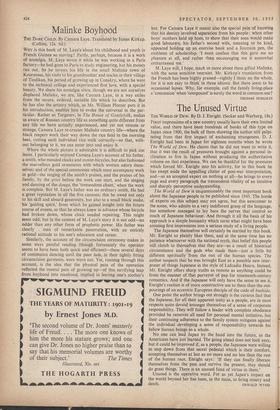The Unused Virtue
THE WORLD OF DEW. By D. J. Enright. (Seeker and Warburg, 18s.) FIRST impressions of a new country usually have their own limited value, and there have been hundreds of books of this type on Japan since 1900, the bulk of them showing the author still palpi- tating from that first impact of enchanting strangeness. D. J. Enright had been in Japan for eighteen months when he wrote The World of Dew. He claims that he did not want to write it, that it was the result of pressures brought against a personal in- clination to live in Japan without producing the -authoritative volume on that experience. We can be thankful for the pressures which forced Mr. Enright into his activity, for in this book he has swept aside the appalling clutter of post-war interpretation, and—as an accepted expert on nothing at all—he brings to every page and every paragraph the tremendous vitality of an intuitive and sharply perceptive understanding.
The World of Dew is unquestionably the most important book about the Japanese people to be published since 1945. The horde of experts on this subject may not agree, but this newcomer to the scene, who admits to a very indifferent grasp of the language, has somehow managed to lay bare the nerves that control so much of Japanese behaviour. And through it all the basis of his approach is a simple humanity which turns What might have been amusing first impressions into a serious study of a living people.
The Japanese themselves will certainly be startled by this book. Mr. Enright so plainly likes them, and at the same time has no patience whatsoever with the national myth, that belief this people still clutch to themselves that they are—as a result of historical circumstance and the gods who made them—just a little bit different spiritually from the rest of the human species. The author suspects that he was brought East as a possible new inter- preter of things Japanese in the style of Lafcadio Hearn. Instead, Mr. Enright offers sharp truths as remote as anything could be from the manner of that purveyor of pap for nineteenth-century romantics. And if the Japanese will only have the sense to see it, Enright's realism is of more constructive use to them than the out- pourings of an eccentric European disciple of the code of birshido.
One point the author brings out strongly is the curious fact that the Japanese, for all their apparent unity as a people, are in most respects quite devoid amongst themselves of a sense of corporate responsibility. They Will follow a leader with complete obedience provided he removes all need for personal mental initiative, but their continuing adherence to the family system mitigates against the individual developing a sense of responsibility towards his fellow human beings as a whole.
No one can lead Japan by the hand into the future, as the Americans have just learned. The going ahead does not look easy, but it could be improved if, as a people, the Japanese were willing to step down from that secret pedestal which is their comfort, accepting themselves at last as no more and no less than the rest of the human race. Enright says : 'If they can finally liberate themselves from the, past and survive the present, they should do great things. There is an unused fund of virtue in them.'
Unused is the operative word. For as yet Japan's impact on the world beyond her has been, in the main, to bring misery and


































 Previous page
Previous page